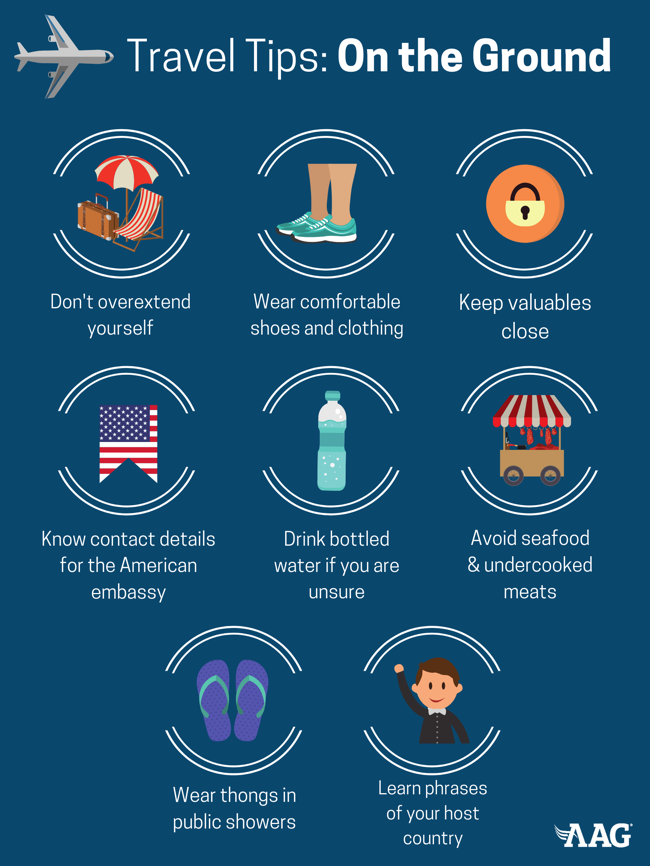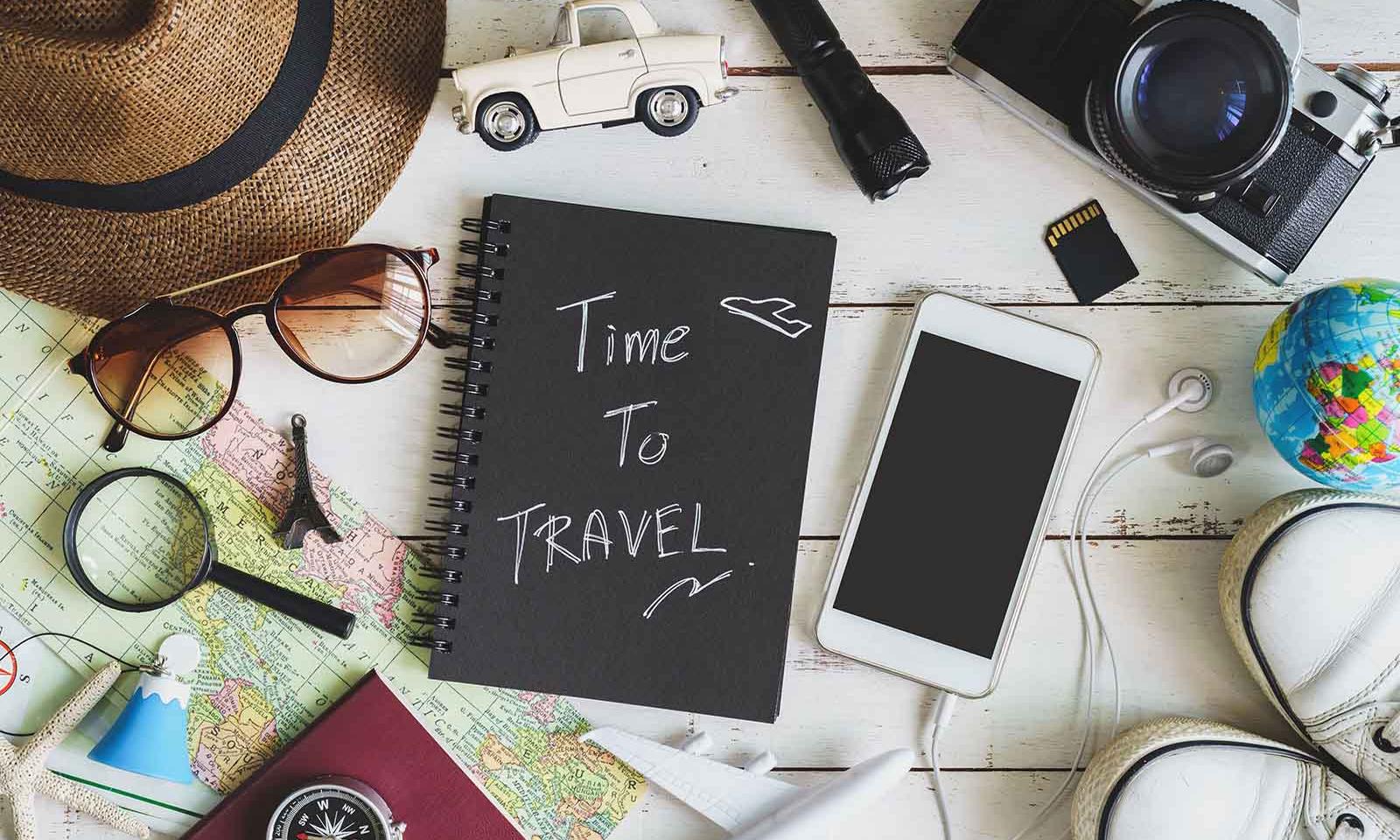Smart, Savvy Travel Tips for Your Next Stress-Free Adventure
Whether you’re 17 or 75, planning your trip is sure to make your journey safer, easier and more enjoyable.
Here are some great travel trips, containing pre-flight, in-flight and on-the-ground instructions to help you get the most out of your next big adventure:
PRE-FLIGHT

Book early so you stand a better chance of obtaining an aisle seat. From an aisle seat, you won’t have to disturb your fellow passengers to walk up and down the aisle, which can help prevent blood circulation disorders, such as a deep-vein thrombosis or DVT that can occur after sitting for long periods. When booking, request any necessary disability options, such as a wheelchair or electric cart, to help you reach boarding gates and other destinations on time. Also, look for nonstop flights, so you won’t have to worry about missing your airline connections. If you have a flexible schedule, book your trip during the so called shoulder season (April-June and September-October) to avoid the crowds.
Make copies of important documents — passport ID page, visas, emergency contacts, list of important medications, etc. — and leave them with a trusted person that can easily be reached by you or emergency personnel.
Familiarize yourself with Transportation Security Administration (TSA) rules. For example, you can bring one quart-sized bag per person for liquids, aerosols, gels, and creams in your luggage. These, however, are limited to travel-sized containers that are 3.4 ounces (100 milliliters) or less per item. The good news is, if you’re 75 and older, you don’t have to take off your shoes or light jacket when passing through security.
See your doctor for a complete check-up, particularly if you have a chronic medical condition. This is critical if you have coronary heart disease, hypertension or any other chronic condition, or if you have recently undergone surgery or experienced a heart attack. If you intend travelling to areas where infectious diseases are present, make sure you are fully vaccinated. If you are taking large amounts of medication with you, then you will need to take a letter of explanation from your doctor. As part of your medical due diligence, visit your dentist, optometrist and other key healthcare providers that regularly consult.
Get travel insurance. Check whether your current provider protects you overseas. Many senior travelers, for instance, may not know that Medicare is not valid outside the United Sates except in limited circumstances. Also consider purchasing an evacuation insurance policy—often called Medvac plans—in the event you or a loved one you suffer a medical emergency (heart attack or stroke, a slip and fall, a car accident, etc.) and need to be airlifted to a nearby hospital or even back to the United States, which could cost thousands of dollars. Roughly two-thirds of people who file for bankruptcy cite medical issues as a key contributor to their financial downfall.
Pack light and fit your possessions into a roll-aboard suitcase. Also make sure your second bag or carry-on stacks neatly on top of your wheeled bag. Plan on keeping any important medications you need in a bag you can put under your seat for quick and easy access. In addition to your medications, pack an extra pair of eyeglasses and maybe a magnifying glass for reading detailed maps and small-print schedules. If you wear a hearing aid, pack extra batteries as well.
IN-FLIGHT

Stay hydrated. Flying at high altitudes is dehydrating, so keep a filled water bottle close and sip it throughout your flight. If you find you have to run to the bathroom more often, that’s a good thing on a long flight. Avoid alcohol or caffeinated beverages, which can deplete the body of water and essential minerals.
Get your exercise in. As mentioned, walk up and down the aisle to improve circulation. While seated, avoid sitting with your legs crossed and stretch your legs and feet regularly.
Bring along your own healthy snacks, such as sliced fruit, nuts, or energy bars, to keep your energy up. This way, you won’t have to be at the mercy of whatever rolls by on the food cart.
Carry some hand sanitizer. The enclosed space of an airplane can create a greater presence for germs so apply sanitizing gel to remove germs and other pathogens from your hands, especially when the opportunity to wash your hands with soap and water isn’t available.
Call on your flight crew for assistance. Need help hoisting your carry-on into the overhead bin? A cup of water? Help with directions to your next boarding gate? An attentive crew should be more than happy to assist you.
ON THE GROUND

Don’t over extend yourself or pack too many activities into a single day. As much as you want to see it all, try to be selective. In fact, give yourself a day to relax and recover from jet lag, especially if you’re crossing time zones, traveling from the west to the east.
Wear comfortable shoes and clothing before hitting the streets and avoid carrying too much cash or expensive valuables like jewelry.
Keep your valuables close and out of sight. Carry traveler’s cheques and credit cards on a belt worn under your clothes. Consider carrying a dummy wallet holding a small amount of cash to dupe a mugger who demands your money.
Know all the contact details for the American embassy. They’re used to helping American travelers get out of tight spots.
Drink bottle water if you are at all unsure of the water supply.
Avoid seafood and undercooked meats, peeled and raw fruits and vegetables and unpasteurized dairy products to reduce chances of food poisoning. Don’t buy food from street vendors.
Wear thongs in public showers to reduce the risk of infectious diseases.
Learn a few key phrases of your host country. Chances are your hosts will speak English but you will more easily earn their courtesy and cooperation by making any earnest attempt to speak their language. D’accord?
If you’re booking your trip with a travel agent or organizations like Road Scholar (Elderhostel before adopting its new name), the American Automobile Association or AARP, ask them for their own list of travel trips.
Also, by consulting TV travel shows, guidebooks, and an unending list of online resources to get the lay of the land, you’ll be that much more prepared to hit the land running for a world of new adventures.
Happy travels!


